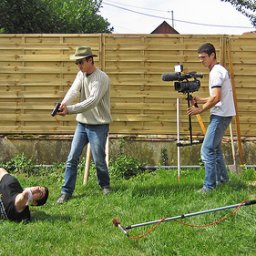- Listen to direction. A director needs to know that they can get what they want out of an actor. Even if you’re a phenomenal actor, directors will not want to work with you if you can’t take direction. Responding well to direction, being able to change how you perform a scene, will make directors much more eager to work with you.
- Visualize a scene when performing it. When acting, you need to visualize where your scene is taking place and then project that image onto your performance space. If you’re gesturing to a clock or a door, put it in an exact place, even if there’s nothing really there. This will give your performance preciseness and keep your gestures and actions from being general and vague.
- Use your nervousness to fuel your performance. Everyone gets nervous when performing. Even seasoned, professional actors who have performed countless times still get stage fright. The key is to channel that anxiety into your performance. Figure out what your character is nervous about and then use your real emotions to inform the performance. Instead of trying to ignore your nerves, channel the energy.
2600 North Stemmons Freeway, Suite 117, Dallas, TX 75207

















